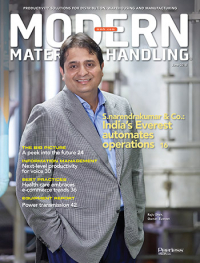Accommodate retail-ready secondary packaging
Modular, automated system packs items in shelf-ready or corrugated secondary packaging.
With labor challenges extending from warehouse to retailer, American operators of brick-and-mortar storefronts are increasingly demanding retail-ready secondary packaging.
It’s an established trend in Europe, says Peter Fox, senior vice president of sales at Somic America, a global manufacturer of automated mechatronics for end-of-line packaging.
“Almost 80% of European retailers expect suppliers to deliver shelf-ready box or pouch products oriented in a specific way and packed in a tray with an easily removed cover,” Fox says. “That significantly reduces time spent stocking shelves. The other 20% still accept a corrugated wrap-around case.”
Further, in Europe there’s a trend for those secondary trays to be glossy paperboard printed with colorful, brand-related graphics and a point-of-sale message—as opposed to brown corrugated.
Currently in the United States, Fox notes the trend is reversed, with 80% of retailers still accepting corrugated secondary packaging and 20% asking for shelf-ready tray packs.
But, he expects that to change with the increasing stateside presence of European retailers—such as Aldi and Lidl who already prefer that format—and as American retailers like Walmart and Kroger realize the time savings that retail-ready packaging creates.
While U.S. consumer packaged goods (CPG) and food manufacturers have packaging lines that can easily accommodate wrap-around corrugated case packing, many contract the building of shelf-ready packs to co-packers who assemble them manually. “It’s extremely expensive to do this, plus it adds transportation costs,” Fox says.
“For that reason, Somic offers modular, end-of-line, automated packaging machines that can be configured to handle corrugated wrap-around packing as well as to create and pack multiple shelf-ready tray patterns,” he says, noting that changeover from one style to the other takes 10 to 20 minutes. The machines eliminate manual handling and can easily adapt to multiple pack patterns in either format.
“As more retailers shift to requiring shelf-ready packaging here in the United States, manufacturers with this system in place can easily accommodate both secondary packaging styles with one machine,” Fox adds. “It addresses labor shortages across the retail spectrum as well as future-proofs an operation.”

Article Topics
Columns News & Resources
New resource center for weighing and dimensioning Protective packaging roundup MODEX C-Suite Q&A: Troy Donnelly, Senior VP of Sales, Marketing, and Application, DMW&H When Just-in-Time Just Doesn’t Work Recycling coastline plastic into premium reusable packaging Fresh food, anyone? RPCs protect in the supply chain Why Isn’t Your Loading Dock Connected to Your Supply Chain? More ColumnsLatest in Materials Handling
Beckhoff USA opens new office in Austin, Texas Manhattan Associates selects TeamViewer as partner for warehouse vision picking ASME Foundation wins grant for technical workforce development The (Not So) Secret Weapons: How Key Cabinets and Asset Management Lockers Are Changing Supply Chain Operations MODEX C-Suite Interview with Harold Vanasse: The perfect blend of automation and sustainability Consultant and industry leader John M. Hill passes on at age 86 Registration open for Pack Expo International 2024 More Materials HandlingAbout the Author
Subscribe to Materials Handling Magazine

Find out what the world's most innovative companies are doing to improve productivity in their plants and distribution centers.
Start your FREE subscription today.
April 2024 Modern Materials Handling

Latest Resources












